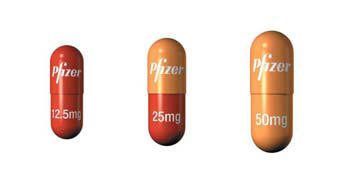General Information
Sutent is a potent tyrosine kinase inhibitor of KIT, PDGFRA and other signaling proteins. Its properties are similar to Gleevec. Both drugs inhibit the KIT protein (mutated in 75-80% of GISTs) and the PDGRα protein (mutated in 5-8% of GISTs). Inhibition of these proteins provides a direct anti-tumor effect when the target protein, (KIT or PDGFRα) is mutated. Additionally, tumors that don’t have KIT of PDGFRα mutations (called “wild-type” GISTS) may still benefit from KIT inhibition.
Sutent also inhibits the “VEGF” receptors. VEGF is one of the most promising of the antiangiogenesis targets.
| Target Proteins Inhibited | |
| Gleevec | Sutent |
| KIT | KIT |
| PDGFRα | PDGFRα |
| PDGFRβ | PDGFRβ |
| abl (including bcr/abl) | VEGFR1 |
| VEGFR2 | |
| VEGFR3 | |
| FLT3 | |
| CSF-1R | |
| RET | |
The United States Food and Drug Administration (FDA) announced Jan. 26 2006, that it approved Sutent (sunitinib) for patients with GISTs who had stopped responding to Gleevec or those who were unable to tolerate Gleevec. It is usually used as a second-line therapy for advanced GIST but is also approved for advanced kidney cancer and for pancreatic neuroendocrine tumors (pNET). Sutent is also approved in a number of countries outside of the United States.
 Sutent comes in 12.5 mg, 25 mg and 50 mg capsules.
Sutent comes in 12.5 mg, 25 mg and 50 mg capsules.
Sutent is known by several different names:
- Sutent, the brand name
- Sunitinib malate, the generic name
- SU11248 (sometimes written as SU011248) in clinical trials
Sutent is a pill that is taken once daily. The usual dosage is 50 mg per day. It is given daily for four weeks, before a two week rest period. This cycle is then repeated as long as the patient continues to show benefit. A phase II trial examining the effects of giving a lower dosage continuously at 37.5 mg appeared to be a safe and potentially effective dosing strategy for some GIST patients. Although significant caution should be applied when comparing two different trial results, the median progression-free survival time of continuous dosing was 34 weeks (7.8 months). This compares favorably with the standard dosing schedule which produced a median progression-free survival time of 6.3 months.
In a world-wide treatment use trial of 1131 GIST patients1, a flexible dosing schedule resulted in a longer time on medication (12.6 months vs 5.2 months) and a longer overall survival (23.4 months vs 11.1 months) compared to patients that remained strictly on the starting dose schedule (4 weeks on/2 weeks off at 50 mg). A higher percentage of patients on the flexible dosing did experience increased side effects (adverse events) compared to the strict starting dose schedule. Because this was not a randomized trial, the results should be interpreted with caution.
“Patients with GIST who received sunitinib using a FD (flexible dosing) approach to manage AEs (adverse events) remained on treatment longer than those who received the strict starting dose schedule and exhibited better clinical outcomes (longer time to progression and overall survival.”
Side Effect Guide
Being able to properly manage the side effects of Sutent, or any drug, is one of the key steps required to allow patients to take their medication as prescribed by their doctor. It is also one of the keys for feeling better and being able to do the things that are important to you.
Sutent.com has an interactive guide to help patients create a list of symptoms and side effects to share with their doctor.
Caution: Proper monitoring is required for patients on Sutent. This includes, but is not limited to:
- monitoring thyroid function
- blood pressure
- blood counts
- monitoring for heart problems.
Managing the Side Effects of Sutent – a Practical Guide
See the LRGs Managing Side Effects section.
Financial Assistance
Patients and physicians can visit www.sutent.com or phone FirstRESOURCE at 1-877-744-5675 for information about patient assistance for those who don’t have drug coverage and for information about reimbursement issues or appeals assistance.
Helpful Links
Sutent Given US Approval
SU11248 works, trial ends 7 months early
Sutent drug listing in LRG drug database (trials, targets, drug facts, trial results, links, side effects, etc).
Results from the (phase 1/2) Continuation Trial of SU11248 in Patients with Imatinib-resistant Gastrointestinal Stromal Tumor (GIST)
Fact sheet (Phase 3 trial summary)
Safety and efficacy of second-line sunitinib in GIST
For more information about Sutent, call your doctor, visit www.sutent.com or see the full Prescribing Information.
Next Steps
Managing Side Effects
Read More about Sutent
Learn about Hand and Foot Syndrome
Better Monitoring for Sutent-Related Heart Problems May Be Warranted
Read about Sutent Drug Interactions (PDF)
A possible drug interaction with bisphophonates (drugs used to treat osteoporosis and bone metastastes) has been reported. Learn about osteonecrosis of the jaw.
References
- P. Reichardt , Y.K. Kang, P. Rutkowski, J. Schuette, L.S. Rosen, B. Seddon, S. Yalcin, L. Chen, K. Fly, G.D. Demetri. Optimizing Management of Sunitinib Treatment in a Worldwide Treatment-use Trial of Patients (Pts) With Advanced Gastrointestinal Stromal Tumour (GIST). 2011 European Multidisciplinary Cancer Congress. Abstract # 9421.
